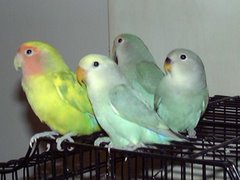Learn About Lovable Lovebirds! - Shari Carpenter
Lovebirds make wonderful pets. Their exquisite colors and animated personalities easily endear them to onlookers. While every bird has its own personality there are traits common to all Lovebirds which have made them a popular pet and a great choice for a first time bird owner.
Appearance
Lovebirds have perhaps the most varied coloration among the parrot species. Years of hybridizing by breeders have developed soft pastels or brilliant hues. You'll find Lovebirds in nearly any color imaginable - blues, yellows, purples, peaches and so on.
Lovebirds are also a pleasantly sized parrot for most people. They are only 5 1/2 to 6 1/2 inches and about 42-60 grams. Baby Lovebirds will be close to the size of an adult Lovebird.
Life Span
Like other parrots, Lovebirds have a long life span - although not as long as the larger species. They live 15-20 years, approximately the same life span as a cat. It is important to understand the commitment before purchasing a Lovebird.
Lovebirds Are Active Little Parrots
Lovebirds are very energetic and inquisitive. They will happily fly about or sit on your shoulder during daily activities. They are not nervous of usual activity and generally can integrate with a family of busy, noisy children with great enjoyment. Lovebirds love to play and are comical to watch whether they are playing alone splashing in their water dish or playing with your hair and sneaking into your collar.
Your best bet is to buy a hand-raised Lovebird which will be more tame than a parent-raised bird. While Lovebirds are quite fearless and should be supervised closely around other pets, they do enjoy playing with people. Gentle and consistent handling will help prevent nipping.
Lovebirds, like other birds, are born to live among a flock and so they will challenge authority for the dominant position. Sometimes headstrong, the owner of a Lovebird needs to be patient and firm. However, Lovebirds are not overly demanding in most respects and will learn to be well-behaved. They are also content to play alone for periods of time as long as they are given proper space and playthings.
Lovebirds are very intelligent and can even be 'potty' trained to go on a paper or in a trash container instead of around the house. This can make it much easier to allow your Lovebird to enjoy freedom outside the cage without the constant clean up.
Vocalizations
While Lovebirds will learn to mimic the sounds around them, including household noises and other birds, they are not known for mimicking human speech as well as other parrot species.
Despite this you will find your Lovebird to have a strong personality all its own and it will convey its moods and desires quite clearly.
Before buying your Lovebird be sure the owner or breeder can provide additional assistance in helping you settle your bird at home. You are likely to have other questions arise as a first time owner and should look for cooperation for properly learning to care for your pet Lovebird.
Permission is granted to reprint full article "as is" with author credit given below and a link back to http://www.birdwatchin.com. There are no private label resale rights available and the article cannot be modified or your name assigned to it.
Shari Carpenter is the owner of http://www.birdwatchin.com, a one-stop resource for people that love bird watching, backyard bird feeding and pet birds. http://www.birdwatchin.com covers a wide range of information, products and supplies, including the blog "Birdwatchin' Buzz Today!" It is also the place to subscribe to the free newsletter "David's Wild Bird News".
Article Source: http://EzineArticles.com/?expert=Shari_Carpenter








 Free Ads For Bloggers
Free Ads For Bloggers

